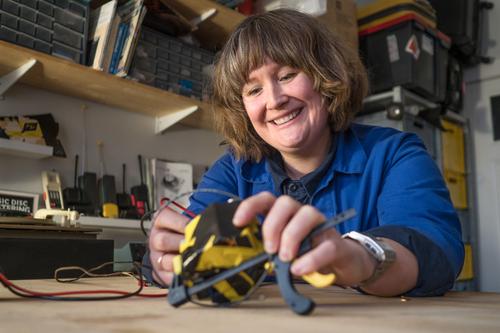
Darsha Hewitt (residency part 1)
The guiding focus of Darsha Hewitt’s residency is an interest in how and where we can blur the line between didactics and art—she strongly believes in the (underrepresented) format of the ‘performative workshop’ and its ability to transcend the learning/teaching dichotomy to create affective encounters with experimental sound.
During her time at Q-02, she will develop an Open Hardware Sound project for live DIY Electronics. The concept is to reconfigure and build an accessible version of her live electronics performance 20 Oscillators in 20 Minutes—a work that aims to demystify technology in an open and lively manner. She wants to create a prototype Performance Kit that includes the materials, technical documentation, and notation required for others to interpret and perform the work. The goal is to make this project as accessible as possible so it can be shared amongst diverse groups (i.e., people without any musical/technical training and also for artists with DIY electronics experience). She will test out compositions, develop a score and technical drawings, and perhaps a how-to video. Exchanges with the community would be invaluable and allow her to collaboratively test out the work and receive feedback along the way.
Darsha Hewitt (CA/DE) is an interdisciplinary artist that investigates the material politics of music and sound. She makes electromechanical sound installations, drawings, audio-visual works, how-to videos, sculptural installations and performative workshops that explore technological entanglements and their implications on humans and ecology.
With a media archeological perspective she explores sound beyond its sonic parameters through deconstruction of discarded technology. She focuses on the ethics of (planned) obsolescence and the practices of technology that consumer society throws away as a way to trace out systems of power, economy and control inherent throughout socio-techno infrastructures.
Alongside reverse engineering, restoration and aesthetic experiments with historically significant music technology, she works with retired industry technicians to learn disappearing tacit knowledge that she integrates into studio research and shares within the art and DIY technology context.